Exploring the Growing Freehold Lands in Demand – Industrial Landscape in Ghaziabad and Greater Noida
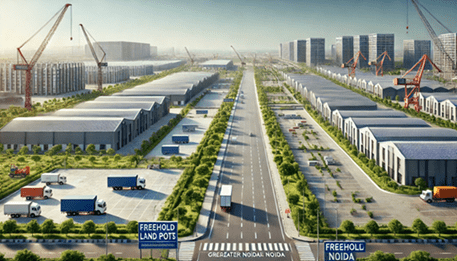
The industrial sector in Uttar Pradesh (UP) has been experiencing significant growth, especially in areas like Ghaziabad and Greater Noida. With a strategic location near the National Capital Region (NCR), these regions have become hubs for industrial development, drawing investors and manufacturers from all over India. In this context, the Uttar Pradesh State Industrial Development Authority (UPSIDA) and other local authorities are playing a pivotal role in facilitating industrial expansion by offering various opportunities, including industrial plots and freehold land for industrial setups. The Rise of Industrial Clusters in Ghaziabad Ghaziabad is home to over 27,000 industries, spread across 11 industrial clusters, including one in nearby Hapur. These clusters employ more than 500,000 people, contributing significantly to the region’s economy. Ghaziabad’s strategic location, with its proximity to Delhi, makes it an attractive option for businesses in the manufacturing, logistics, and warehousing sectors. As companies continue to expand, there is an increasing demand for industrial plots in Ghaziabad. In 2020, the Uttar Pradesh State Industrial Development Corporation (UPSIDC) introduced a policy allowing existing industries to retain 50% of the land they occupy while taking back 12.5% for redistribution. This policy aims to create more efficient use of available land while also helping industrial units expand by purchasing smaller plots. The availability of freehold land in these regions is especially attractive to manufacturers, as it offers long-term ownership and security. The UPSIDC’s Industrial Land Projects in Greater Noida Greater Noida, which falls under the UPSIDC’s jurisdiction, has emerged as one of the prime locations for industrial development. UPSIDC industrial land in Greater Noida is available for a range of purposes, from manufacturing to warehousing and logistics. The development of industrial parks in Greater Noida, such as the upcoming hubs in Newari, is attracting significant interest due to their proximity to both the capital city and major transportation corridors. The UPSIDA plans to acquire private land in Newari to develop an industrial hub, and while this process is still underway, it is expected to be completed soon, providing ample opportunities for industrial growth. The authority has already submitted a proposal to acquire 210 acres of private land to complement the existing 140 acres of gram sabha land. The estimated cost for setting up the hub is around Rs 128 crore. With land acquisition moving forward, businesses seeking industrial plots in Ghaziabad and Greater Noida will have more options to explore. Freehold Plots and the Upsurge of Industrial Parks One of the most attractive features of industrial land in Ghaziabad, Noida, and Greater Noida is the availability of freehold plots. Unlike leasehold properties, freehold land provides the buyer with complete ownership, offering greater security and long-term value. This has led to a boom in the construction of industrial parks and the development of freehold plots for industrial setups in Ghaziabad and other parts of the NCR. For businesses looking to purchase an industrial plot in Ghaziabad, freehold land offers an added advantage, especially with the recent support from the Uttar Pradesh Government’s Industrial Policy. This policy supports the conversion of land to freehold for industrial use, making it easier for businesses to acquire land for factories, warehouses, and other industrial operations. In addition to the advantages of freehold ownership, these industrial parks are being developed at much lower prices compared to UPSIDC’s land prices, making them even more appealing to businesses. Investors looking for a freehold plot in Ghaziabad can find numerous opportunities to set up operations in newly developing industrial areas, often at competitive prices. YEIDA Plots: A Key Player in Industrial Growth Another crucial player in the region’s industrial development is the Yamuna Expressway Industrial Development Authority (YEIDA), which has been developing large-scale industrial parks along the Yamuna Expressway. YEIDA plots are an attractive option for manufacturers and investors due to their strategic location, ease of connectivity to major highways, and availability of infrastructure. These plots are gaining popularity as businesses look to expand in the region. YEIDA is actively working on creating an environment conducive to industrial growth, with dedicated zones for different sectors, such as electronics, automobile manufacturing, and textiles. The availability of YEIDA plots has further contributed to the rapid expansion of industrial clusters along the Yamuna Expressway, complementing the ongoing development in Ghaziabad and Greater Noida. Find Your Ideal Industrial Plot with Plotwalla.com As the industrial landscape in Ghaziabad and Greater Noida continues to evolve, businesses are increasingly turning to online platforms to find the right properties. Platforms like Plotwalla.com offer a wide range of listings for industrial plots for sale in Ghaziabad, including freehold land, making it easier for investors to identify and acquire the perfect plots for their needs. Whether you are looking for land in Ghaziabad, Noida, or Greater Noida, Plotwalla.com provides detailed information and options to help you make an informed decision. With its user-friendly interface and comprehensive property listings, Plotwalla.com simplifies the search process for industrial land. Whether you are interested in UPSIDC industrial land in Greater Noida, YEIDA plots, or industrial plots for sale in Ghaziabad, this platform is a valuable resource for navigating the growing industrial real estate market in Uttar Pradesh. Conclusion The industrial growth in Ghaziabad, Greater Noida, and other parts of Uttar Pradesh is a testament to the region’s potential as a manufacturing and logistics hub. With initiatives from UPSIDA and YEIDA, the availability of freehold industrial plots is helping businesses expand and thrive. For those seeking an industrial plot in Ghaziabad, the industrial plot for sale in Ghaziabad, or UPSIDC industrial land in Greater Noida, platforms like Plotwalla.com offer a convenient and efficient way to find the perfect property.
Warehousing Demand in India Grows at 15% Annually, Driven by E-Commerce

India’s warehousing sector is expanding rapidly, clocking a 15% annual growth rate, primarily fueled by the rise of e-commerce. This robust growth trajectory is reshaping the logistics and industrial landscape, with significant implications for regions such as Greater Noida, Ghaziabad, and Noida International Airport. Below, we delve into the factors driving this growth, the challenges, and the opportunities for investors and businesses alike. Key Drivers of Warehousing Demand Opportunities for Investors Greater Noida Industrial Plot Rates and Demand The Greater Noida region, particularly in Site 5, has witnessed increased interest in industrial and commercial plots. Investors looking for industrial plots for sale in Ghaziabad or factory spaces in Greater Noida can capitalize on the growing demand, supported by infrastructural advancements and proximity to major highways. Prime Warehouse Land for Sale in Noida International Airport The development of Noida International Airport is expected to be a game-changer for warehousing and logistics. The airport’s strategic location enhances connectivity, making it an ideal spot for warehouse land investments. Industrial and Commercial Plots in Noida and Ghaziabad Both regions are well-suited for logistics parks and storage facilities, given their connectivity and industrial ecosystem. PlotWalla offers tailored solutions for investors seeking industrial plots in Greater Noida or warehouse land for sale in Noida, with expert support for legal and regulatory requirements. Explore Warehousing Opportunities at PlotWalla Challenges in Warehousing Development Future Outlook The Indian warehousing market is projected to grow at a compound annual growth rate (CAGR) of 12%, reaching 595 million sq. ft. by 2027. The Grade-A stock is expected to grow even faster at 16% CAGR, driven by the rising preference for quality facilities. The e-commerce sector will remain a major contributor, alongside manufacturing, FMCG, and retail. As industrial activities continue to rise, regions like Greater Noida and Ghaziabad will play pivotal roles in meeting the storage and distribution needs of businesses. Why Choose PlotWalla for Warehousing Investments? PlotWalla simplifies the process of buying and selling industrial and commercial plots. Whether you’re seeking industrial land in Greater Noida or exploring opportunities near the Noida International Airport, PlotWalla ensures seamless transactions with unmatched expertise.
India’s Industrial Real Estate Market is Projected to Reach $1 Trillion by 2030

India’s industrial real estate market is on the brink of a transformative decade. With the sector expected to reach a staggering valuation of $1 trillion by 2030, it is becoming a crucial pillar of the nation’s economy. A combination of policy support, infrastructure upgrades, foreign investments, and the ever-expanding role of e-commerce drives this growth. In this blog, we explore the drivers of this growth, key market trends, emerging opportunities, and the challenges that lie ahead. The $1 Trillion Milestone: An Overview In 2020 India’s industrial real estate market was approximately $344 billion. With a compound annual growth rate (CAGR) of 8-10%, it is poised to triple its valuation by 2030. This exponential growth underscores the critical role of industrial real estate in accommodating manufacturing, logistics, and warehousing needs. Key Drivers of Growth in India’s Industrial Real Estate 1. Government Policies and Reforms 2. The E-Commerce Revolution The rise of e-commerce giants like Amazon, Flipkart, and Reliance Retail has accelerated the need for warehouses and fulfillment centers. Modern warehouses, equipped with advanced technology for inventory management and automation, are being constructed in strategic locations near urban centers. 3. Foreign Direct Investment (FDI) India has become a magnet for foreign investors due to its economic reforms and growing consumer market. The relaxation of FDI norms in the real estate sector has encouraged multinational corporations to invest in industrial real estate, leading to the development of world-class industrial parks. 4. Urbanization and Population Growth India’s urban population is set to reach 600 million by 2031. This demographic shift drives demand for consumer goods, manufacturing facilities, and supporting infrastructure, all of which require industrial spaces. Key Trends Shaping the Sector 1. Smart Industrial Parks Industrial parks are being designed with sustainability and technology at their core. IoT-enabled facilities, renewable energy sources, and advanced logistics systems are becoming the norm. These smart parks are attracting environmentally conscious businesses and global players. 2. Focus on Tier-II and Tier-III Cities As land prices in metropolitan areas soar, developers are turning to Tier-II and Tier-III cities like Indore, Lucknow, and Coimbatore. These cities offer affordable land, improving infrastructure, and a skilled workforce, making them ideal for industrial investments. 3. Growth of Freehold Land Options Freehold industrial plots are gaining popularity due to their flexibility, ease of ownership, and reduced regulatory hurdles. These plots are particularly attractive to companies with long-term strategic goals. 4. ESG Compliance Environmental, Social, and Governance (ESG) factors are influencing investment decisions. Developers are constructing energy-efficient buildings, incorporating solar energy solutions, and using sustainable construction materials to align with global ESG standards. Challenges in the India’s Industrial Real Estate Despite its promising growth trajectory, the sector faces certain challenges: Opportunities for Investment Domestic Investors With the rise of Real Estate Investment Trusts (REITs), domestic investors can now invest in industrial real estate assets with relatively low capital. REITs focusing on warehousing and logistics are gaining popularity for their stable returns. Global Investors India’s integration into global supply chains presents a lucrative opportunity for foreign investors. Logistics, manufacturing hubs, and warehousing facilities are high-growth areas with long-term potential. The Role of Infrastructure Development Infrastructure plays a pivotal role in the growth of industrial real estate. Mega projects like the Delhi-Mumbai Industrial Corridor (DMIC), dedicated freight corridors, and expressways like the Purvanchal Expressway are creating opportunities for industrial development. Enhanced connectivity reduces logistics costs and improves efficiency, making India more competitive on the global stage. Why 2030 is a Turning Point The $1 trillion projection for India’s industrial real estate market by 2030 isn’t just a number; it’s a reflection of India’s transformation into a global economic powerhouse. Factors contributing to this milestone include: Conclusion: A Golden Era for India Industrial Real Estate India’s industrial real estate market is entering a golden era of growth, innovation, and opportunity. The convergence of favorable policies, technological advancements, and infrastructure upgrades makes this sector an attractive proposition for investors and businesses alike. As the market races toward the $1 trillion mark by 2030, now is the time for stakeholders to capitalize on its potential. Whether you’re a domestic investor eyeing REITs or a global player planning to expand operations, the opportunities in India’s industrial real estate sector are immense. For expert guidance and access to industrial plots in key locations like Greater Noida and Ghaziabad, explore PlotWalla, your trusted partner in industrial real estate.
The Growing Industrial Pollution Crisis in Ghaziabad and Noida

A Call for Action As urbanization and industrialization continue to shape the landscape of India, certain regions are bearing the brunt of the environmental cost. Among them, Ghaziabad and Noida stand out, facing significant pollution challenges due to their dense industrial presence. The effects of these pollutants—ranging from toxic air to contaminated water—are becoming increasingly difficult to ignore. In this blog post, we will explore the state of industrial pollution in Ghaziabad and Noida, the categories of pollution, and potential solutions to address the issue. Ghaziabad, part of the National Capital Region (NCR), is home to a vast array of industries ranging from heavy manufacturing to chemical production. The latest data released by the state pollution control board reveals that Ghaziabad has 403 highly polluting industries. These industries contribute significantly to the region’s pollution levels, making it one of the most polluted areas in the NCR. On the other hand, Noida, with its emphasis on IT and service sectors, has a comparatively smaller number of highly polluting industries—66 in total. However, this does not mean that Noida is immune to pollution. The city is home to many industrial units involved in activities like plastic processing, metal coating, and chemical manufacturing, which also contribute to the growing pollution problem. Pollution Classification: Understanding the Severity The data presented by the pollution control board categorizes industries based on their environmental impact. The industries are classified using a composite score that considers air pollution (40%), water quality (40%), and the nature of waste (20%). This classification system helps determine the severity of pollution caused by individual industries. The pollution index is divided into four categories: Red: Highly polluting (score above 60) Orange: Poor (score between 30 and 59) Green: Less polluting (score between 15 and 29) White: Non-polluting (score below 15) In Ghaziabad, industries like pulp and paper mills, textile dyeing units, and metallic surface treatment facilities fall under the red category due to their high environmental impact. Similarly, Noida also has industries in the red category, although in much fewer numbers. The Numbers Behind the Pollution Out of the nearly 1,300 registered industries in Noida, 670 industries are classified as orange (poor), while 562 are in the green (less polluting) category. This distribution suggests that while many industries in Noida have made efforts to improve their environmental footprint, there is still a considerable number of industries contributing to air and water pollution. Ghaziabad, with around 1,040 industrial units, fares similarly. Of these, 303 industries fall under the orange category, and 308 are classified as green. The remaining industries are categorized as either red or white, with the former contributing significantly to the pollution problems in the region. The significant number of orange and green industries in both Noida and Ghaziabad highlights the fact that pollution is not only concentrated in the red-category industries. Many industries, though not classified as highly polluting, still contribute to the overall environmental burden. The orange and green categories may indicate that these industries have taken steps to reduce their impact, but there is still considerable room for improvement. Key Pollutants and Their Impact Industries in both Noida and Ghaziabad emit a wide range of pollutants that contribute to air, water, and soil contamination. Some of the most common pollutants include: Air Pollution: Industrial activities like the burning of fossil fuels, chemical processing, and plastic manufacturing release harmful gases such as carbon monoxide, nitrogen oxides, sulfur dioxide, and particulate matter (PM). These pollutants not only degrade air quality but also pose serious health risks to residents, including respiratory diseases, heart conditions, and long-term environmental damage. Water Pollution: Many industries discharge untreated wastewater into nearby rivers and streams, leading to severe water contamination. Chemicals, heavy metals, and industrial waste find their way into water bodies, making the water unsafe for consumption and harming aquatic life. Waste Disposal: Improper disposal of industrial waste contributes to soil and water contamination. In many cases, industries dispose of hazardous waste without following proper disposal protocols, which leads to toxic waste accumulation in landfills and nearby water sources. The Major Culprits: Industries Driving Pollution Certain industries contribute disproportionately to pollution levels in Ghaziabad and Noida. Some of the primary offenders include: Pulp and Paper Mills: These mills use a significant amount of water and chemicals in their production processes, resulting in the release of toxic effluents into water bodies. Additionally, the burning of wood and other materials in these mills leads to air pollution. Textile Dyeing: Textile dyeing units, particularly in Ghaziabad, are notorious for discharging large amounts of untreated wastewater filled with toxic dyes and chemicals. These pollutants contaminate both water and soil, affecting the local ecosystem. Metallic Surface Treatment: This industry, which involves the use of chemicals like chromium and nickel, poses a significant risk to water quality. Improper disposal of wastewater from these industries leads to the contamination of groundwater and nearby water bodies. The Role of Urbanization and Industrial Growth The rapid urbanization of Ghaziabad, Noida, and Greater Noida has exacerbated the pollution crisis. As these cities continue to grow, more industries are being set up, often without adequate environmental checks in place. While industrial growth drives economic development, it also places a significant strain on natural resources and the environment. In Noida, the expansion of industrial zones and the establishment of industrial parks have led to a rise in the number of industries contributing to pollution. Similarly, Ghaziabad’s proximity to Delhi has made it an attractive destination for industries looking to set up operations. However, this growth has come at the cost of air and water quality. The Need for Comprehensive Solutions The situation in Ghaziabad and Noida calls for urgent action. While both cities have made strides in addressing pollution through regulations and monitoring, more needs to be done to curb industrial emissions. Here are a few solutions that can help mitigate pollution levels. Stronger Enforcement of Environmental Regulations: While the state pollution control board monitors pollution levels, more rigorous enforcement of environmental regulations is needed. Industries must
What Permissions Are Required for Establishing a Factory in Ghaziabad?
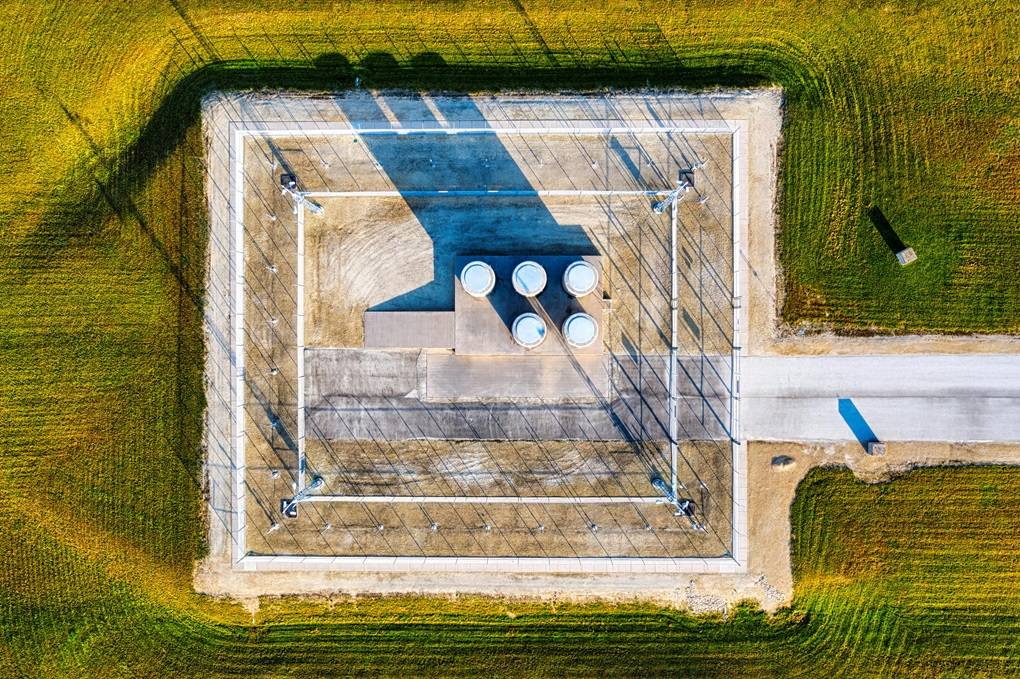
Ghaziabad, a bustling industrial hub in Uttar Pradesh, has witnessed significant growth in recent years. Many entrepreneurs and businesses are setting up their factories in the region due to its proximity to Delhi and robust infrastructure. However, establishing a factory in Ghaziabad requires complying with several legal and regulatory requirements. These permissions ensure that the factory operates legally, safely, and in accordance with environmental and safety standards. If you’re looking for an industrial plot for sale in Ghaziabad, understanding the necessary permissions and approvals is crucial before you start building and operating your factory. Let’s explore the key permissions required for setting up a factory in Ghaziabad. 1. UPSIDC Department Permissions (Uttar Pradesh State Industrial Development Corporation) The UPSIDC plays a pivotal role in the development of industrial infrastructure in Uttar Pradesh, including Ghaziabad. Before purchasing an industrial plot for sale in Ghaziabad, it is essential to ensure that the land is zoned for industrial use. The UPSIDC provides the necessary permissions to set up a factory on industrial plots. These permissions are based on the type of industry, the location of the land, and adherence to industrial zoning regulations. Once you have the plot, you will need to get the necessary approvals from the UPSIDC to start building your factory. Key Steps: – Obtain land allotment from UPSIDC.– Submit an application for factory registration.– Get approval for factory layout and design. 2. Fire Department No Objection Certificate (NOC) The safety of workers and the surrounding environment is a primary concern when setting up any industrial facility. The Fire Department No Objection Certificate (NOC) is mandatory for all factories, regardless of their size or scale. The fire department ensures that your factory complies with the fire safety norms, including the installation of fire alarms, fire extinguishers, and emergency exit plans. Key Steps:– Submit the fire safety plan along with factory layout to the fire department.– Install necessary fire safety equipment and systems.– Obtain the Fire NOC after inspection and approval. 3. Building Construction Norms When constructing a factory, it’s crucial to adhere to the local building construction norms. These norms ensure that your factory is safe, structurally sound, and compliant with local laws. The Ghaziabad Development Authority (GDA) is responsible for approving building plans, including the layout and design of the factory building. Key Requirements: – Submit building plans to GDA for approval.– Ensure compliance with the national and state building codes.– Carry out construction only after receiving approval. 4. Uttar Pradesh Pollution Control Board (UPPCB) NoC Factories can have significant environmental impacts, especially in terms of air, water, and soil pollution. To ensure that factories operate sustainably, the Uttar Pradesh Pollution Control Board (UPPCB) issues a No Objection Certificate (NOC) after assessing the environmental impact of the proposed factory. The factory must comply with environmental regulations, including waste management and emissions control, to obtain this NOC. Key Requirements:– Conduct an environmental impact assessment (EIA).– Implement pollution control measures such as waste treatment plants and emission filters.– Submit the required documents to UPPCB for approval. 5. Electricity Department Connection with Approved Load Electricity is a fundamental requirement for factory operations. To ensure smooth operations, you will need to apply for an electricity connection from the local electricity board. The Electricity Department will assess the load requirements based on the factory’s machinery and operational needs. After approval, you will be granted the necessary power supply. Key Requirements:– Apply for a power connection from the Uttar Pradesh Power Corporation Limited (UPPCL).– Submit documents such as the factory’s load demand and infrastructure plans.– Pay the required security deposit and get the connection. 6. Labour Department Registration The Labour Department of Uttar Pradesh mandates that all factories employing more than 10 workers must register with the department. This registration is crucial for compliance with labor laws, such as the Factories Act, 1948, and other labor welfare regulations. This step ensures the protection of workers’ rights, including wages, working hours, and safety standards. Key Requirements:– Register the factory under the Factories Act.– Ensure compliance with labor laws, including minimum wage standards, working conditions, and social security benefits. 7. Employee Provident Fund (EPF) Registration Factory owners must also register for the Employee Provident Fund (EPF), which is a social security scheme designed to benefit workers in the long run. EPF registration is mandatory for factories employing more than 20 workers. This ensures that employees save for their future and get access to benefits such as retirement, pension, and insurance. Key Steps:– Register your factory under the EPF Act.– Deduct and contribute the required percentage of employees’ wages to the EPF account.– Ensure regular payments and timely submission of returns. 8. Employee State Insurance Corporation (ESIC) Registration The Employee State Insurance Corporation (ESIC) provides health insurance and social security benefits to employees in case of accidents, illness, or maternity. Factory owners with more than 10 employees must register with ESIC. This helps provide medical care and compensation to employees, enhancing worker welfare. Key Requirements:– Register your factory with ESIC if you have more than 10 employees.– Make regular contributions to the ESIC fund.– Ensure that all eligible workers are covered under the scheme. Conclusion Setting up a factory in Ghaziabad involves navigating through various regulatory processes to ensure legal compliance and environmental safety. From obtaining land allotment from UPSIDC to securing ESIC registration and ensuring fire safety, each permission plays a vital role in ensuring that your factory operates smoothly and responsibly. If you are looking for an industrial plot for sale in Ghaziabad, it’s crucial to partner with a trusted real estate platform that can guide you through the entire process of land acquisition, permission collection, and factory setup. Visit Plotwalla https://plotwalla.com for more details on available industrial plots in Ghaziabad and expert assistance in navigating the legal requirements. By securing all the necessary permissions, you can ensure that your factory runs efficiently while complying with local, state, and national regulations. So, if you are planning to establish a factory in Ghaziabad, start by acquiring the
Moving from Delhi to Ghaziabad or from Delhi to Greater Noida? What would be the best option.
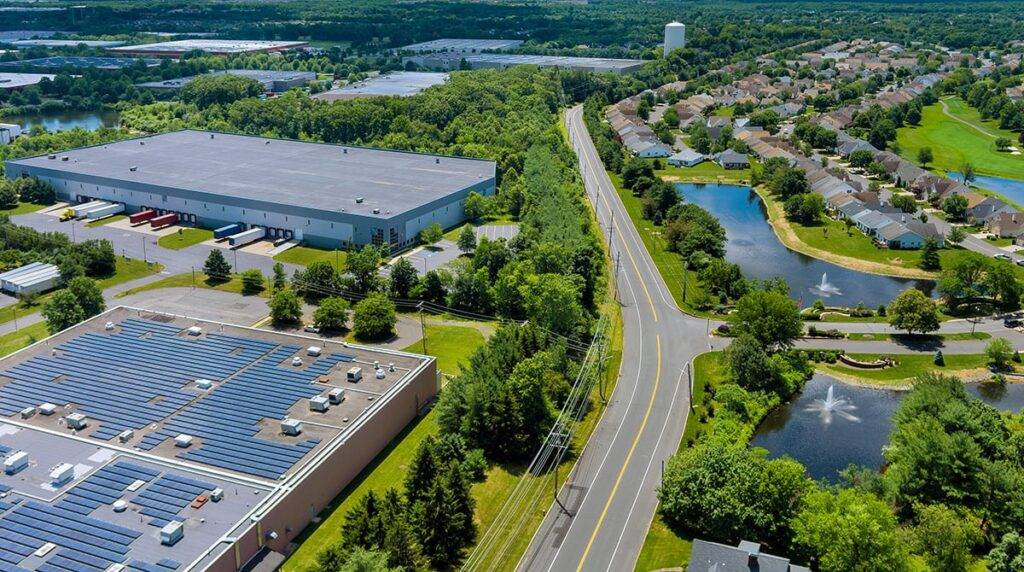
What would be the best option for relocating a factory setup: moving from Delhi to Ghaziabad or from Delhi to Greater Noida? When considering relocating a factory setup from Delhi, both Ghaziabad and Greater Noida offer unique advantages, but the best option depends on your specific business needs. Relocating Your Factory Setup: Ghaziabad vs. Greater Noida Relocating a factory setup is a significant decision that can impact your business operations, costs, and growth potential. For many businesses in Delhi, the neighboring regions of Ghaziabad and Greater Noida present compelling options. Both areas have unique advantages, making the decision a critical one. In this blog, we will explore the benefits and considerations of moving a factory setup to Ghaziabad and Greater Noida. https://plotwalla.com Overview of Ghaziabad Strategic Location and Connectivity Ghaziabad is strategically positioned in the National Capital Region (NCR) and is well-connected via three major expressways: the Eastern Peripheral Expressway (EPE), the Delhi-Meerut Expressway, and National Highway 24 (NH 24). This extensive road network allows for efficient logistics, making it easier for businesses to transport goods and access markets. The close proximity to Delhi also enables easy access to suppliers and clients. Industrial Ecosystem The industrial landscape of Ghaziabad is diverse, with a wide range of industries, including manufacturing, textiles, pharmaceuticals, and engineering. This established industrial ecosystem means businesses can benefit from an existing supply chain, skilled labor pool, and various ancillary services. Moreover, Ghaziabad is home to numerous industrial estates and parks, offering a conducive environment for new factories. Cost-Effectiveness One of the most appealing aspects of relocating to Ghaziabad is cost-effectiveness. Compared to Greater Noida, property prices and operational costs in Ghaziabad tend to be lower, which can significantly reduce initial investments for factory setups. This affordability is particularly beneficial for startups and small to medium enterprises (SMEs) looking to expand. Overview of Greater Noida International Business Hub Greater Noida has emerged as a favored destination among the international business community. The region’s focus on attracting foreign investment is evident through various incentives and policies that promote industrial growth. This international appeal is beneficial for companies looking to establish a global presence or collaborate with foreign partners. Dedicated International Airport One of the standout features of Greater Noida is the upcoming Noida International Airport (Jewar Airport), which will significantly enhance connectivity for businesses involved in international trade. The airport is expected to facilitate the movement of goods and services, providing a logistical advantage for industries reliant on import and export activities. Specialized Industrial Clusters Greater Noida is home to several specialized industrial clusters, such as the Electronic City, which focuses on electronics and IT-related manufacturing. These clusters offer businesses access to advanced infrastructure, research and development facilities, and a network of industry peers. This specialization can drive innovation and efficiency, making Greater Noida an attractive choice for tech-oriented manufacturers. Modern Infrastructure and Amenities The region boasts modern infrastructure, including wide roads, reliable utilities, and advanced telecommunications. This infrastructure is complemented by various amenities such as hotels, conference centers, and recreational facilities, making it an attractive location for businesses and their employees alike. Key Considerations for Relocation Conclusion Relocating your factory setup from Delhi to either Ghaziabad or Greater Noida offers distinct advantages that cater to different business needs. Ghaziabad excels in cost-effectiveness and established industrial infrastructure, making it ideal for traditional manufacturing setups. On the other hand, Greater Noida is increasingly appealing to international businesses, with its modern infrastructure and upcoming airport enhancing its global connectivity. Contact us https://plotwalla.com Ultimately, the best choice will depend on your specific business requirements, growth aspirations, and long-term strategy. Taking the time to thoroughly evaluate each option will ensure that you make an informed decision that supports your company’s future success.
Discover Prime Commercial and Industrial Plots for Sale in Delhi and Greater Noida
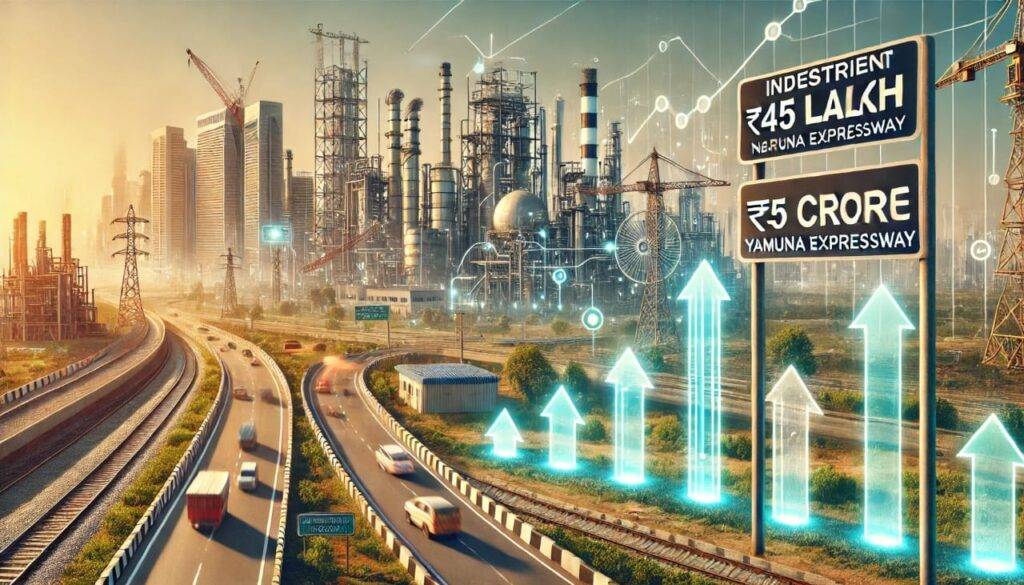
In the heart of India’s bustling economy, the demand for commercial and industrial properties continues to soar. Whether you are an investor seeking lucrative opportunities or a business owner in need of space, the real estate market in Delhi and Greater Noida offers exceptional options. In this article, we will explore various commercial plots for sale in Delhi and Greater Noida, as well as industrial plots and factories that can help you capitalize on the region’s potential. Commercial Plots for Sale in Delhi Delhi, being the capital city, is a hub of business activities and economic growth. The demand for commercial plots in Delhi has been on the rise, driven by the influx of startups, multinational corporations, and retail businesses. Here are some of the key features and benefits of investing in commercial plots in Delhi Strategic Location: Delhi’s connectivity through major highways, metro lines, and proximity to the international airport makes it a strategic choice for businesses. Investing in commercial plots here can offer excellent visibility and accessibility. Diverse Opportunities: From retail shops to office spaces, commercial plots in Delhi can cater to a wide range of business needs. Whether you’re looking to establish a restaurant, a tech startup, or a retail outlet, there are ample options available. Infrastructure Development: The government’s focus on infrastructure development, such as the Delhi-Mumbai Industrial Corridor, enhances the value of commercial properties. This ongoing development attracts more businesses, increasing the potential for property appreciation. Industrial Plots for Sale in Delhi For businesses looking to expand their manufacturing or warehousing capabilities, industrial plots in Delhi offer excellent opportunities. These plots are strategically located to facilitate logistics and distribution. Flexible Sizes: Industrial plots come in various sizes, catering to different business requirements. Whether you need a small plot for a startup or a larger space for a manufacturing unit, there are options available. Supportive Ecosystem: Delhi’s industrial landscape is supported by various government schemes and incentives aimed at promoting manufacturing and job creation. This supportive ecosystem can significantly benefit your business. Factory for Sale in Greater Noida Greater Noida is emerging as a prime destination for industries, thanks to its robust infrastructure and planned development. If you’re in the market for a factory, consider the following advantages of investing in a factory for sale in Greater Noida: Proximity to Key Markets: Greater Noida’s strategic location near Delhi and major highways facilitates easy access to key markets. This is crucial for businesses involved in manufacturing and distribution. Well-Developed Infrastructure: The region boasts well-planned roads, transportation facilities, and utilities, making it an attractive option for factories. The availability of essential services supports smooth operations. Affordable Pricing: Compared to Delhi, factory prices in Greater Noida are generally more affordable. This allows businesses to invest in larger spaces without straining their budgets. Industrial Plot for Sale in Greater Noida For those looking to establish or expand their industrial operations, industrial plots for sale in Greater Noida present a golden opportunity. Here’s why you should consider investing in this region: Planned Industrial Zones**: Greater Noida is home to designated industrial zones, ensuring that businesses are located in an environment conducive to growth. These zones are designed to provide the necessary infrastructure and services. Government Support: The Uttar Pradesh government has implemented several policies to attract industries to Greater Noida, including tax incentives and subsidies. This support can significantly reduce operational costs. Exceptional Factory for Sale in Noida Noida, a neighboring city to Greater Noida, is also a prime location for factories. If you are on the lookout for an exceptional factory for sale in Noida, consider the following: Thriving Business Environment: Noida is known for its flourishing IT, manufacturing, and service sectors. This thriving environment can provide numerous networking opportunities and collaborations for your business. Modern Amenities: Factories in Noida often come equipped with modern amenities, ensuring that your operations run smoothly. High-quality infrastructure enhances productivity and efficiency. Future Growth Potential: With ongoing developments and a strong industrial base, investing in a factory in Noida offers promising growth potential. As the demand for products increases, so will the value of your investment. Conclusion Investing in commercial and industrial plots in Delhi and Greater Noida is a strategic decision that can yield substantial returns. With a thriving economy, supportive infrastructure, and various options available, the time is ripe for investors and business owners to explore these opportunities. Whether you’re looking for commercial plots for sale in Delhi, industrial plots for sale in Greater Noida, or factories that promise exceptional growth, the real estate market has something for everyone. Explore your options today and take the first step towards securing a prime property that aligns with your business goals! Plotwala.com: Industrial Factory and Warehouse Solutions
Industrial Factory and Warehouse Solutions
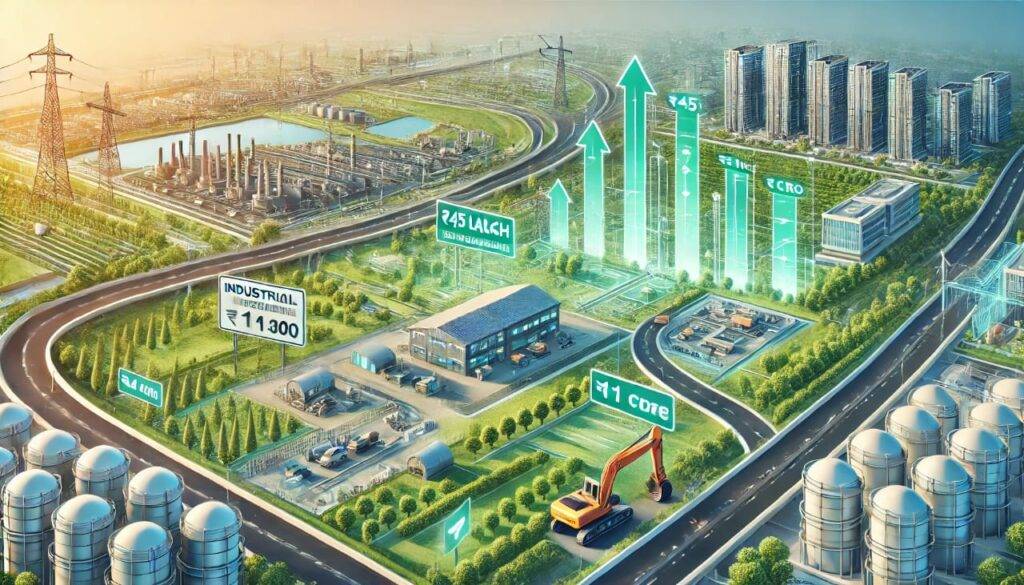
At Plotwalla.com, we turn your dream of business land ownership into reality. We offer a variety of properties tailored to meet every business need, including Industrial, Commercial, Factory, and Warehouse Solutions!
Businesses Are Shifting Their Factories
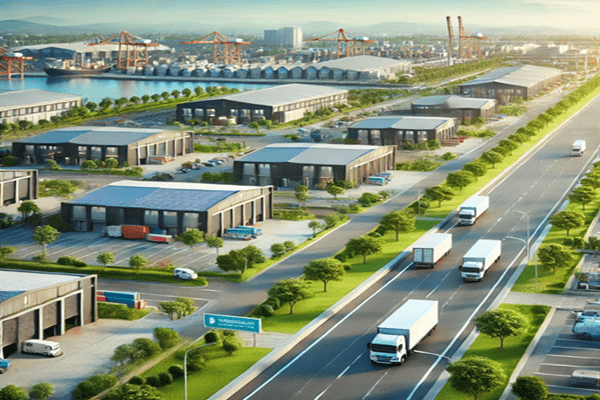
In recent years, industrial plot prices in Delhi have risen significantly. Consequently, many businesses are relocating their factories to nearby cities like Ghaziabad and Noida.
